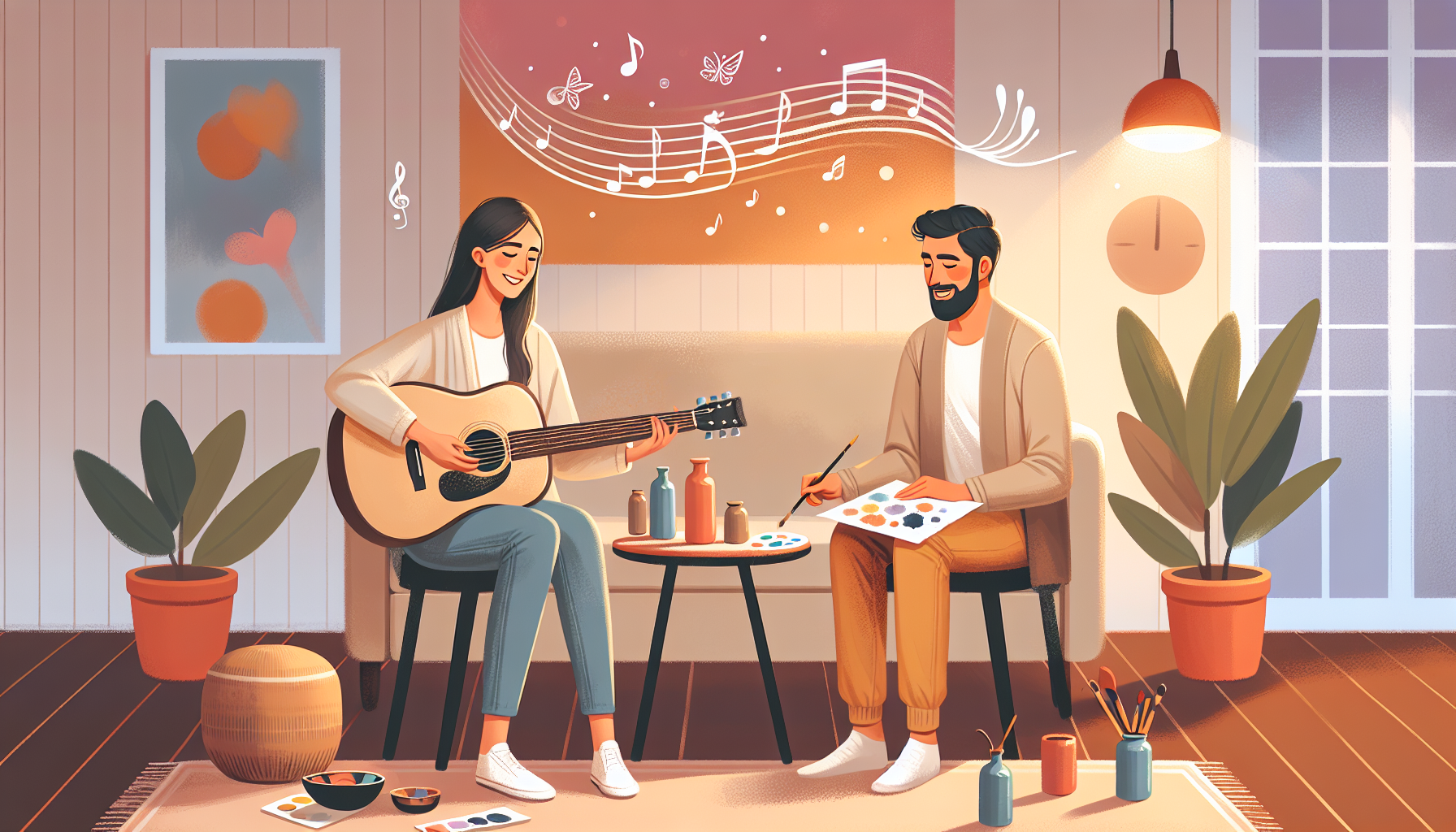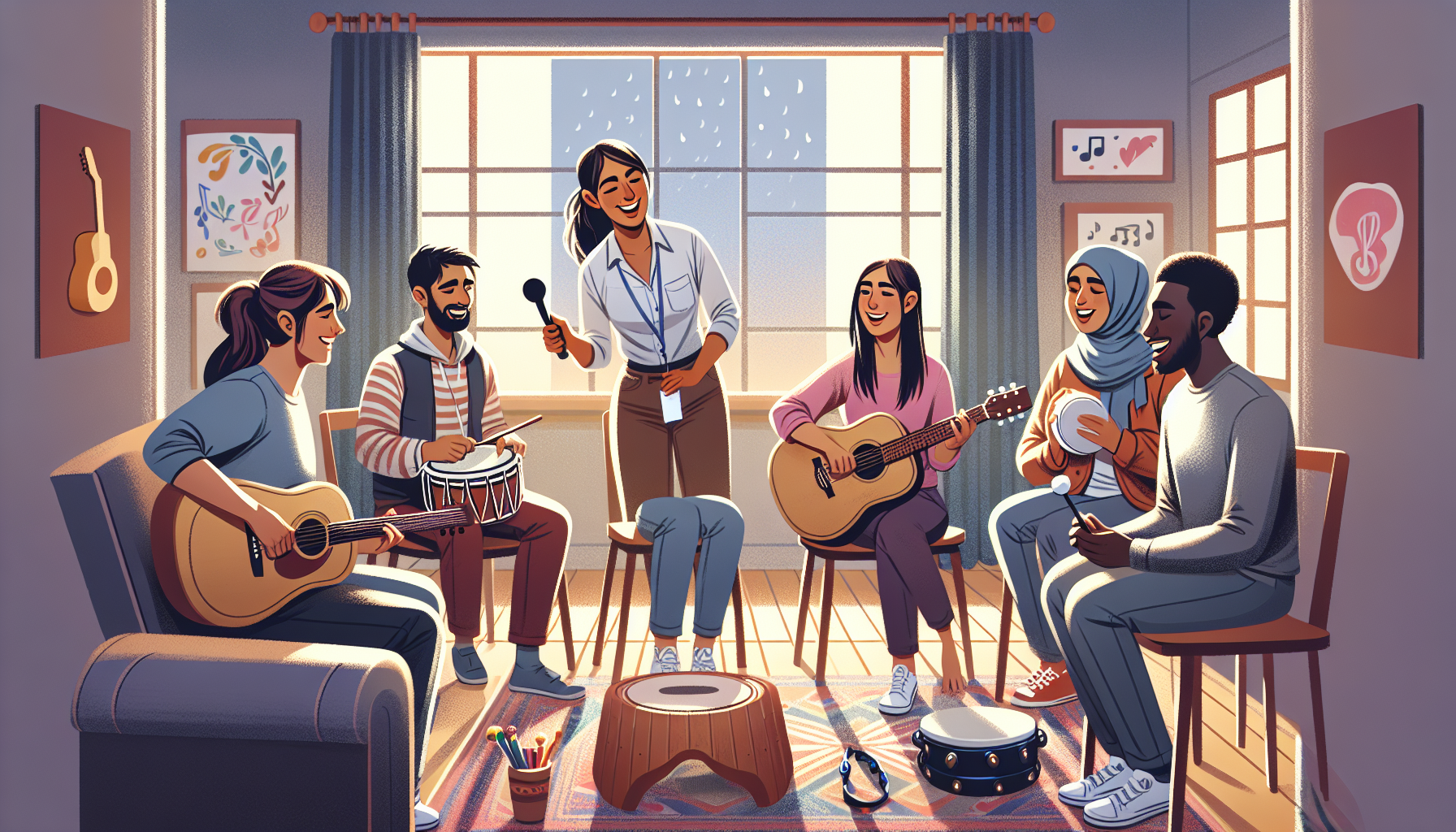If you’re a music therapist, you might sometimes feel stuck on how to engage your clients with fresh ideas. The pressure to create meaningful experiences can be overwhelming, especially when you’re trying to cater to individual needs. Don’t worry; you’re not alone in this!
But what if I told you that ChatGPT can be a fantastic buddy in brainstorming creative prompts? Stick around, and you’ll discover a treasure trove of ideas that will spice up your sessions and keep your clients motivated and involved.
From personalized playlists to engaging songwriting activities, we’ll explore various prompts that can enhance your music therapy practice. Get ready to turn those “what do I do now?” moments into “I’ve got this!” breakthroughs!
Key Takeaways
– Use prompts to create conversation starters, emotional expression activities, and personalized music playlists.
– Incorporating music enhances emotional expression and client engagement.
– Songwriting and lyrical analysis encourage self-expression and deeper discussions about feelings.
– Guided relaxation can be improved with music prompts for a calming experience.
– Engaging clients through singing activities boosts participation and communication skills.

Effective ChatGPT Prompts for Music Therapy Sessions
Using ChatGPT to generate music therapy prompts can be really helpful in creating engaging sessions. Here are some effective prompts you can use:
- “Generate a list of potential conversation starters for music therapy clients.”
- “Provide 5 unique prompts that encourage clients to express emotions through music.”
- “Suggest ways to incorporate a client’s favorite songs into therapy discussions.”
- “Create prompts to help clients reflect on how music affects their moods.”
These prompts can spark meaningful conversations and deepen the therapeutic experience.
How to Use Music in Therapy with ChatGPT Prompts
Incorporating music into therapy sessions can enhance emotional expression and engagement. Here’s how you can use ChatGPT for this purpose:
1. Ask for specific music genres that might resonate with your client. For example, “Suggest five uplifting songs from the 80s.”
2. Utilize ChatGPT to create a music activity. Type, “List 3 activities that use music to facilitate relaxation during therapy.”
3. Generate questions for exploring how clients relate to different songs: “What emotions do you feel when listening to [specific song]?”
Using these strategies can help deepen the therapeutic relationship and enhance client involvement.
Prompts for Creating Personalized Music Playlists in Therapy
Curating personalized music playlists can significantly improve therapeutic outcomes. Here are some prompts to get started:
- “Create a playlist of calming songs suitable for a mindfulness session.”
- “Compile a list of high-energy songs that can be used for motivation during therapy.”
- “Suggest songs that evoke nostalgia and can be discussed in therapy settings.”
- “List 5 songs that focus on themes of resilience and overcoming challenges.”
These prompts can guide you in selecting music that aligns with your clients’ needs and therapeutic goals.
Using ChatGPT for Songwriting Activities in Music Therapy
Songwriting can be an incredibly therapeutic activity. Here are some prompts to facilitate songwriting during sessions:
- “Generate lyrical ideas based on the theme of hope and healing.”
- “Create a structure for a song about personal growth to use in therapy.”
- “Suggest a list of prompts to help clients brainstorm song ideas related to their experiences.”
- “Help clients develop a chorus that expresses their emotions about a specific event.”
These prompts can encourage creative self-expression and promote healing through music.

Prompts for Guided Relaxation and Mindfulness Using Music
Guided relaxation and mindfulness can be significantly enhanced with the right music prompts. Here are some effective prompts you can use:
- “List five calming tracks ideal for a guided meditation session.”
- “Generate a sequence for a 10-minute relaxation exercise that integrates music.”
- “Suggest instrumental pieces that promote mindfulness and focus during therapy.”
- “Create a script for a mindfulness session that includes music cues for deep breathing.”
These prompts can help guide your clients toward a more peaceful state, fostering a healing environment.
Engaging Clients with Singing and Vocalization Prompts
Singing and vocalization can break down barriers and make therapy more interactive. Here are prompts to encourage engagement:
- “Provide three fun vocal warm-up exercises for clients to try.”
- “Create a list of songs that clients can sing together to build rapport.”
- “Suggest call-and-response vocal activities suitable for various skill levels.”
- “Generate prompts for clients to create their own lyrics based on personal experiences.”
By integrating these singing prompts into your sessions, you can boost client participation and enjoyment.
Improving Communication Skills Through Music Therapy Prompts
Music therapy can serve as a powerful tool for enhancing communication skills. Here are some prompts to facilitate this:
- “List five songs that encourage expression of feelings and emotions.”
- “Suggest activities that require clients to convey a message using only music.”
- “Generate a list of discussion questions focused on lyrics that express strong emotions.”
- “Provide prompts for clients to share stories inspired by their favorite songs.”
Using these prompts can create opportunities for clients to express themselves verbally in a safe setting.
Prompts for Analyzing Lyrics and Discussing Meanings in Sessions
Analyzing lyrics can open up vital discussions about feelings and experiences. Here are prompts to guide your analysis:
- “Choose a popular song and list five questions to spark discussion about its themes.”
- “Generate prompts for clients to analyze specific lines from their favorite songs.”
- “Suggest ways to connect song lyrics to personal experiences in therapy.”
- “Create a list of songs that exemplify different emotional states for analysis.”
These prompts encourage deeper reflection and can guide clients in understanding their emotions better through music.

Incorporating Instrument Play into Music Therapy with ChatGPT
Instrument play can be a fantastic way to enhance engagement and expression in music therapy. Here are some prompts for incorporating instrument activities into your sessions:
- “Suggest three simple instrument activities for beginners that promote emotional expression.”
- “Create a list of instruments that can be used for group activities in therapy.”
- “Generate prompts for clients to create sounds that reflect their current feelings.”
- “List five song ideas that can involve instrumental participation from all clients.”
These prompts can encourage clients to actively participate and explore their emotions through music.
Prompts for Assessing Progress in Music Therapy Sessions
Tracking progress in music therapy is essential for understanding client growth. Here are some effective prompts to facilitate this:
- “Create a list of reflective questions for clients to evaluate their emotional progress through music.”
- “Generate prompts for discussing changes in clients’ feelings and behaviors over time.”
- “Suggest evaluation criteria that include emotional, social, and musical skills development.”
- “List five ways to assess the effectiveness of specific music interventions with clients.”
Using these prompts, you can foster meaningful discussions about growth and development in therapy.
Creative Icebreakers Using Music for Therapy Sessions
Icebreakers can set a positive tone for therapy sessions, helping clients feel comfortable. Here are some music-themed icebreaker prompts:
- “Suggest a fun music trivia game that can be played to encourage interaction among clients.”
- “Create a prompt for clients to share their all-time favorite song and why it resonates with them.”
- “Generate a list of musical warm-up exercises that encourage vocalization and connection.”
- “Provide ideas for a group activity that involves creating a collaborative song.”
These prompts can help break the ice and establish a sense of community among clients.
FAQs
Using ChatGPT prompts can enhance music therapy by guiding session themes, generating personalized playlists, facilitating songwriting, and providing relaxation techniques, ensuring sessions are engaging and tailored to client needs.
To create personalized music playlists, use prompts to gather client preferences, moods, and therapeutic goals. ChatGPT can suggest songs that align with these criteria, fostering an enjoyable and effective therapeutic experience.
Prompts for songwriting can include themes related to personal experiences, emotions, or challenges. Encouraging clients to express feelings and stories through music fosters creativity and enhances therapeutic engagement.
Assess client progress by incorporating prompts that encourage reflection on goals, emotional responses, and skill development throughout sessions. Use these responses to adapt therapeutic approaches and celebrate client achievements.
